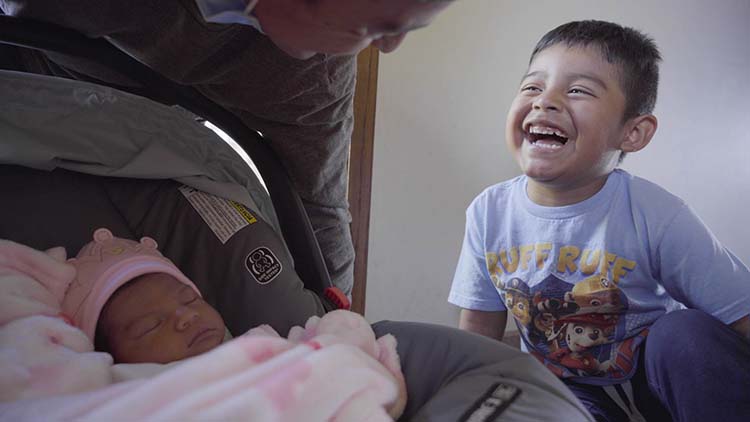
By Donald H. Harrison

SAN DIEGO – All We Carry is an 87 ½ -minute documentary that follows Honduran refugees through Mexico to their detention at the Tijuana/ San Diego border and later, as adoptees of a Seattle, Washington, synagogue as they awaited a decision on their applications for asylum in the U.S.
The documentary is available for educational and community screenings via Good Docs.

Producer/ director/ co-writer Cady Voge follows the journey of Magdiel, his fiancée Mirna, and son Joshua over a three-year period starting in 2018 when they joined a migrant caravan and hiked and rode northward in an open-air train known in Mexico as “the Beast.” They chose to join the caravan for reasons of safety; small groups or single travelers through Mexico have often been preyed upon by criminal gangs.
Narcotics criminals in Honduras, who murdered members of Magdiel’s and Mirna’s families, were the reason they shlepped their toddler son on the treacherous journey. In a revealing moment, Magdiel confessed that he wanted to kill the men who murdered his father which, were that desire realized, would put a target on his back and cause a never-ending cycle of retribution that might jeopardize the life of Joshua. He opted instead to remove his family from that situation.
Arriving at the San Diego border, Mirna and Magdiel decided to be married in a ceremony conducted by a minister wearing butterfly wings on her back. They felt married couples – even those joined in matrimony in such unusual circumstances – had a better chance of being accepted in the United States.
Mirna and Joshua spent 19 days in U.S. detention before being allowed to travel to Seattle where a cousin lived. Separated from his wife and child, Magdiel waited three months for permission to travel to Seattle, where he would be required to check in regularly with immigration authorities.
Kol HaNeshamah Progressive Synagogue in West Seattle voted to extend help to Magdiel and family. A congregant who owned a second large house on the waterfront gave the refugees free use of it for the majority of the time they waited for a decision on their asylum applications.
It had a large yard for Joshua to play in. The home’s interior was equipped with modern devices. The couple had never enjoyed such luxury before. Evangelical Christians, they also were introduced to Jewish ritual, with the documentary showing them witnessing a musical Havdalah service and being introduced to the celebration of Chanukah with dreidels and menorahs. No effort was made to convert them; in fact, they were supplied with many presents under their Christmas tree.
The couple hadn’t known about modern-day Judaism; they thought Jews were the people of the Bible but hadn’t realized that Jews now lived in many countries.
The documentary shows the family gradually learning to speak English and adapting to American ways. At the same time, it showed how much they missed their family members who remained in Honduras – a homesickness only slightly alleviated by regular cellular phone calls back and forth.
During a two-year waiting period for a hearing on their asylum application, Mirna gave birth to Shelsea, providing Joshua with a little sister. The couple also had a second wedding ceremony—she in a proper wedding dress, he in a fine suit—with their new American friends in cheerful attendance.
Eventually the family who had loaned them use of the big house needed it back, so the congregation moved them into a smaller home. Under American rules for refugees, they were not permitted to hold formal jobs, so the congregation collected money for an account on which they were permitted to draw. They also were supplied with a car. Grateful for the help, Magdiel volunteered to help congregants with their home projects.
At last, the hearing was held, and the judge told Magdiel a written decision on his family’s application would come in 30 days. The movie reflected the tension felt by the family of four and their American supporters as they awaited word of their fate.
*
Donald H. Harrison is publisher and editor of San Diego Jewish World